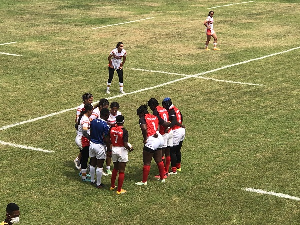Accra, Sept. 29, GNA – The Institute of Continuing and Distance Education (ICDE) of the University of Ghana, Legon is to play a leading role in promoting the use of an educational tool kit designed by the Association for the Development of Education in Africa (ADEA).
ADEA is a working group on Communication for Education and Development (WG COMED).
This was announced by Mr Lawalley Cole, WG COMED’s Co-ordinator at the end of a three- day tool kit pre-validation workshop organised in Accra by the body in collaboration with ICDE, and the Ghana Journalists Association (GJA).
The tool kit will contribute to on-the-job capacity building for journalists and media practitioners, who are engaged in the regional network of journalists and other media experts as well as the implementation of national policies and programmes related to educational journalism.
The workshop was held from September 26 to 28 September, and attracted 50 participants from Anglophone, Francophone and North African countries made up of journalists, communication experts, journalism educators, communication officers in Ministries of Education, other media practitioners and members of civil society organisations.
Addressing the closing ceremony on Wednesday, Mr Cole noted that over the last three years COMED has developed partnerships aimed at enhancing national capacity to produce high quality reporting of educational news in Africa, with a number of training institutions in Africa, as well as experts from media institutions.
Mr Cole explained that ICDE was carefully selected for the collaboration on account of its expertise, capacity and track record in the field of continuing and distance education.
He said a group of communication experts from COMED and others will be put together to do extra work on the tool kit.
Professor Yaw Oheneba-Sakyi, Director of ICDE, University of Ghana, Legon accepted the challenge and assured COMED that the Institute’s involvement and lead role in promoting the effective use of the tool kit will have a positive impact on the project.
He said the essence of the distance education programme is to make quality education more accessible and relevant at all levels to meet the learning needs of people so as to enhance their performance and improve the quality of their lives.
Prof Oheneba-Sakyi noted that ICDE has the expertise and capacity to play the lead role in the project.
“We will help COMED develop an electronic version of the final tool kit as this will aid e-learning,” he stressed.
Ghana’s distance education policy covers three main areas, which are, access and participation, quality of teaching and learning and governance and management. The University of Ghana uses the popular “KEWL.NEXTGEN” as its e-learning platform.
They called on stakeholders in education and development in Africa to adopt participatory and institutional approaches in their planning and implementation strategies.
Mr Dave Agbenu, the Organising Secretary of the GJA gave a summary report on the tool kit section on Advocacy and Social Mobilisation and on Media Monitoring and Advocacy for Education and Development.
The consensus was that all the pertinent issues raised in the course of the workshop should be taken on board by the COMED working group and incorporated in the final tool kit.
ADEA is a forum for policy dialogue and a catalyst for educational reform. It represents a genuine partnership between African education and training ministries and their technical and external partners.
Through its activities ADEA has developed a network of policy-makers, educators and researchers.
WG COMED’s vision is to promote joint action for building confidence, trust, and ownership among ministries of education and finance, the media, and all education stakeholders across the African continent.
Regional News of Friday, 30 September 2011
Source: GNA
















